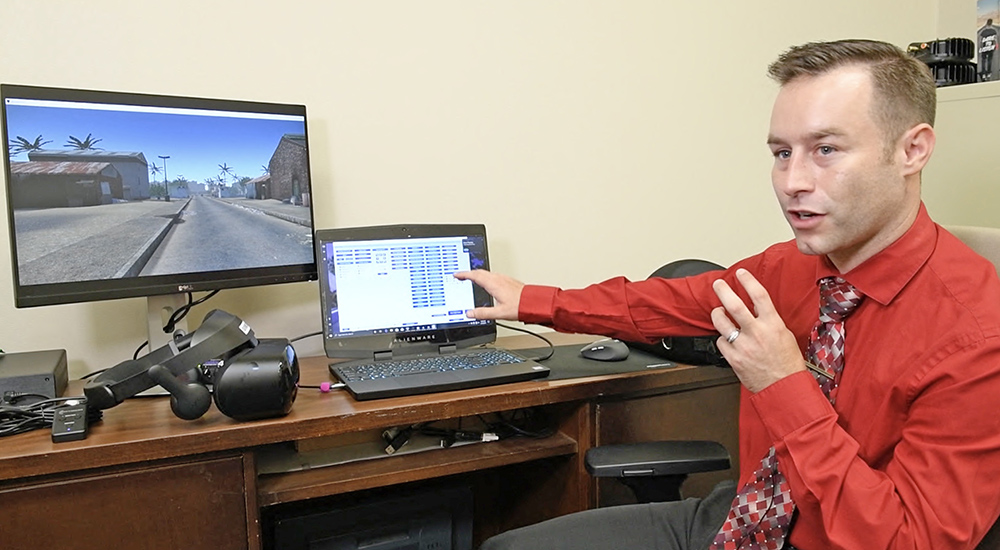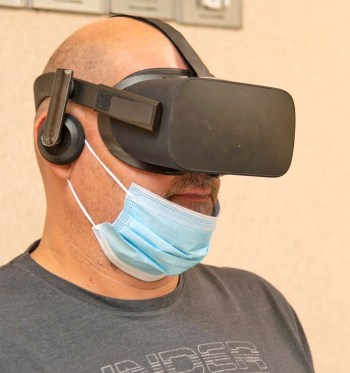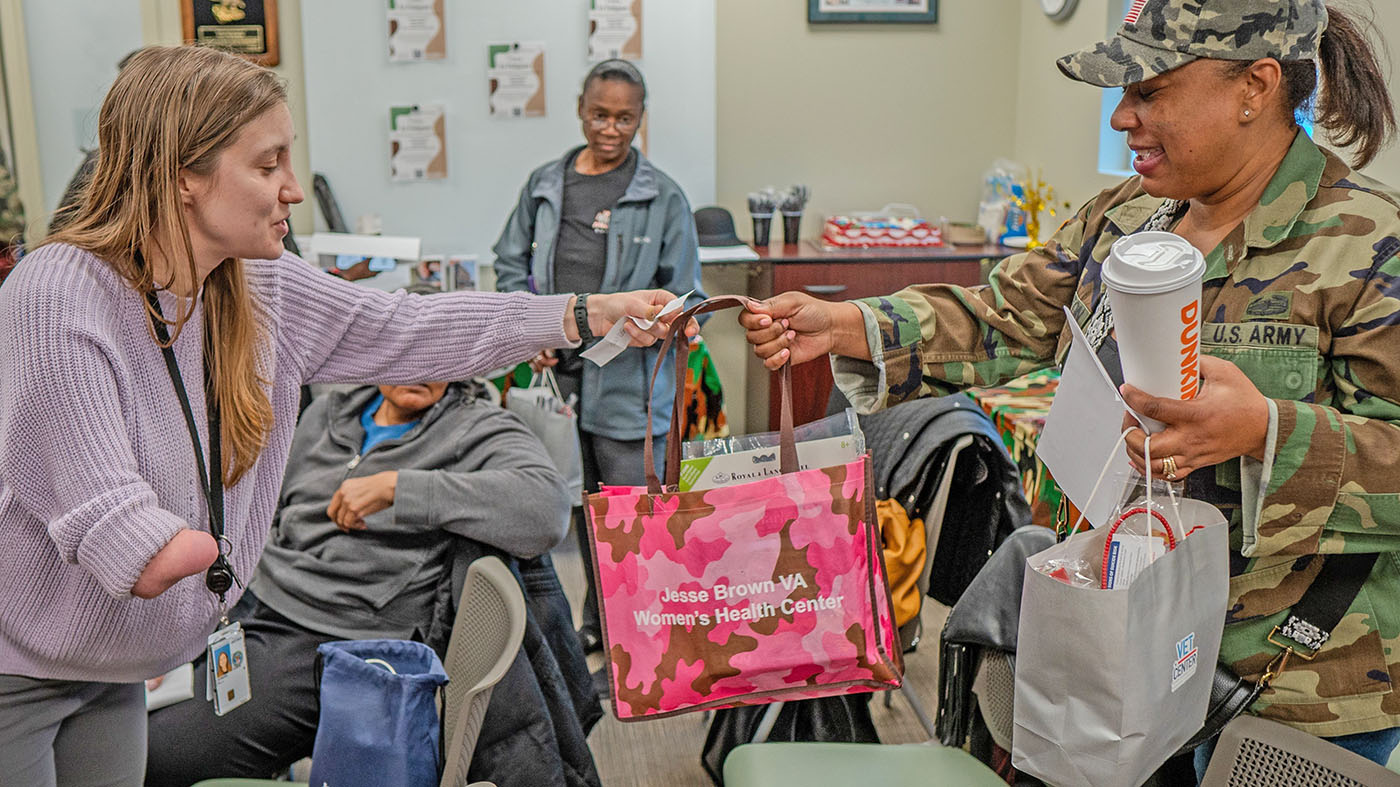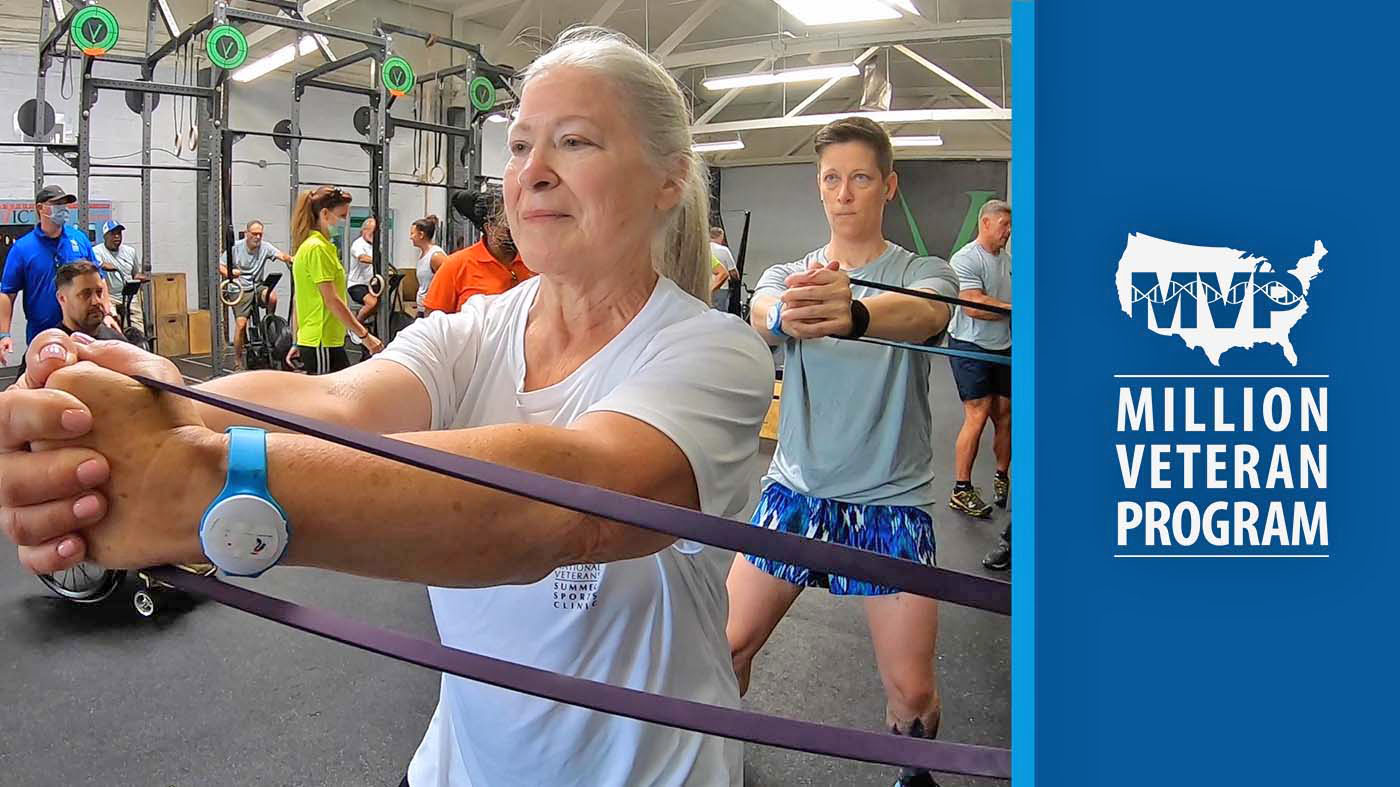Virtual reality—an immersive experience that may include the sights, sounds, smells and reactions to a situation—is an effective tool, and is used and taught at VA for treating post-traumatic stress disorder (PTSD) and fine motor skills deficits.
VA is a recognized leader in the research, diagnosis and treatment of PTSD, utilizing proven evidence-based therapies. Virtual reality is being incorporated into prolonged exposure (PE) therapy, a long-standing research-backed psychotherapy treatment protocol for PTSD.
Psychologists like Christopher Holland-DeGuire of North Texas VA are specializing and teaching in this area.
Prolonged exposure therapy aids in emotional processing
Holland-DeGuire completed his psychology residency at Dallas VA and became interested in virtual reality’s effectiveness in treating trauma victims. He went on to complete VR training there and now teaches psychology residents to use the technology in conjunction with PE therapy.
PE therapy involves a therapist guiding a patient through the retelling of their most severe trauma to re-experience those memories. Over time, PE therapy aids the Veteran in the emotional processing of those traumatic memories.
“When I meet with a Veteran, we just talk about what their experience was,” Holland-DeGuire said. “I find their index trauma and we talk about what was most severe for them. I then recreate that experience (in a virtual reality scenario) as close as possible for the Veteran. The effects of processing the index trauma tend to carry over to less impactful traumas, which results in a reduction in traumatic stress and PTSD symptomatology.”
While Veterans often seek to avoid memories of trauma, the virtual reality environment allows Veterans to be immersed in their traumatic incident with the use of all their senses, sight, sound, touch and even smell, while controlling the pace of their exposure to the scenario.
They know they are in a safe place
Research shows that virtual reality enhances the effectiveness of PE treatment and can provide meaningful improvement for combat and military sexual trauma-related PTSD.
For a Veteran with PTSD, virtual reality sessions can be quite intense, which is why Holland-Deguire says it is important for the psychologist to engage with the Veteran during the simulation session and talk with them after the session.
“After they are at that heightened level and they take off the mask, they know that they are in a safe place. We talk about what the feelings were like and what messages they were receiving.”
Over the course of treatment, virtual reality and PE therapy will help the Veteran recognize when they are faced with a trauma trigger in their everyday life and, that while it may feel like they are back in the trauma, they are not, and they are safe.
Holland-Deguire understands that virtual reality sessions can be an intense experience for psychology residents, too. That’s why he allows residents to set the pace during training just as he does with his Veteran patients during treatment.
“Sometimes the residents just want to sit and watch it,” he said. “They want to see what the experience is like. They want to see how and what you do to create the story. And some want to get fully in. It matters what stage of training they are in and we match their experience with where they’re at.”
Playing games improves fine motor skills
Virtual reality is also being used and taught in other clinical areas in VA. At Des Moines VA, occupational therapists and health professions trainees are using virtual reality to improve fine motor skills in geriatric patients. Older patients play virtual reality “games” where they go through a supermarket picking up groceries to fill their shopping cart.
Trainees are also trained in the use of the technology and they evaluate the results of the session to track patient progress over time, determining if other therapies or interventions are needed for the individual patient.
Virtual reality and augmented reality are part of a larger group of immersive technologies collectively known as extended reality (XR), and it’s currently available at more than 160 VA medical facilities. The VA XR Network’s ongoing research and development, piloting and implementation of these innovative technologies has led to expanded use across VA and greater benefits for Veterans and staff.
Using virtual reality to treat amputees with phantom limb pain
VA has been recognized as the global leader of clinical implementation of XR in health care. One notable research study out of Dallas VA uses virtual reality to treat amputees experiencing phantom limb pain. Several participants report decreased pain when using VR therapy with positive effects lasting after treatments.
VA Health Professions Education Week, March 13 – 17, 2023, celebrates VA’s academic mission, health professions trainees, VA faculty and clinical educators, and academic affiliates who work together to care for Veterans while training future health care professionals.
VA operates the largest education and training platform for health professionals in the nation. More than 118,000 health professions trainees representing over 60 clinical disciplines participate in 7,700 training programs provided through partnerships between VA and over 1,400 academic institutions, including 96% of U.S. medical schools.
These academic affiliations, some of which began more than 75 years ago, are coordinated by VA’s Office of Academic Affiliations (OAA). Find out more about VA’s academic mission by watching this video and visiting the Office of Academic Affiliations website.
Topics in this story
More Stories
Navy Veteran and president of the American Medical Association got a colonoscopy and encourages other Veterans to do the same.
Chicago Vet Center and VA gave women Veterans information on VA services available to them.
MVP’s research informs personalized care for Veterans, supporting whole health and beyond.







